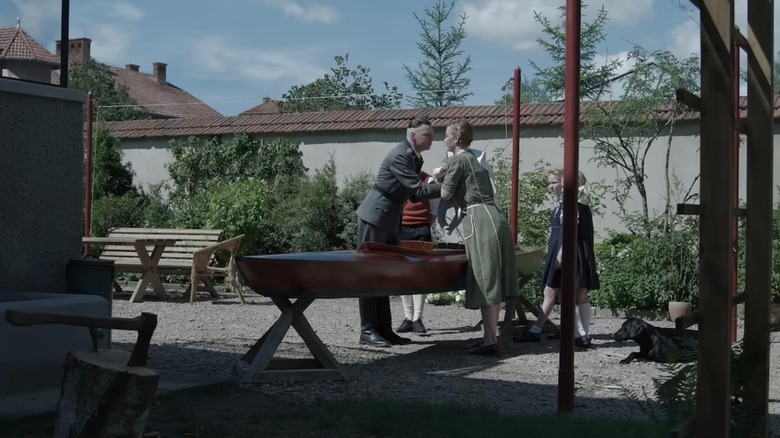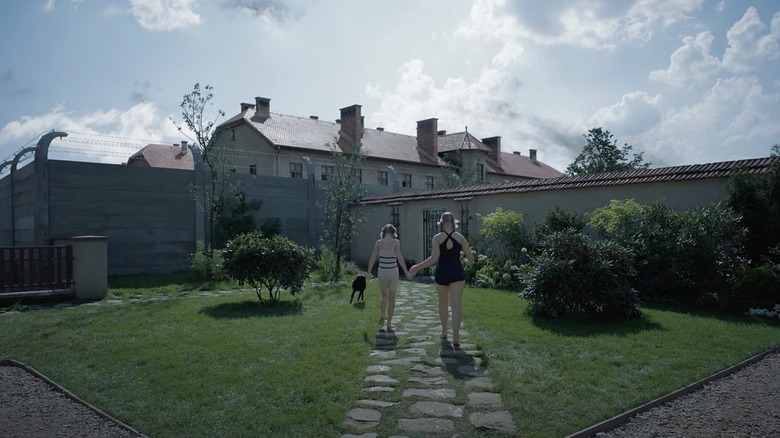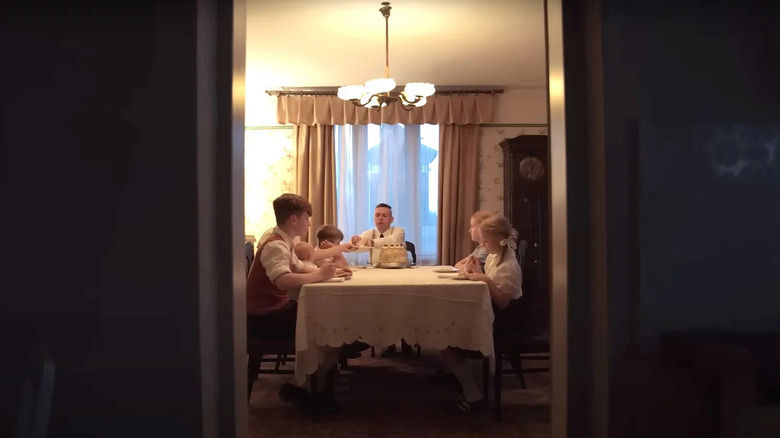The Zone Of Interest Is One Of The Most Disturbing Movies You'll Ever See
Jonathan Glazer's new film "The Zone of Interest" was given a limited theatrical release on December 15, 2023, and one might have already seen it popping up on critics' best-of-the-year lists. Indeed, it was voted the best film of the year by the Los Angeles Film Critics Association, and was nominated for Best Picture at the Golden Globes. It also won or was nominated for multiple awards at the Chicago Film Critics Association Awards, the National Board of Review, the National Society of Film Critics, and the Toronto Film Critics Association. "The Zone of Interest" opened to a wider audience on January 7, 2024, and the public at large now has an opportunity to see Glazer's harrowing, utterly disturbing World War II drama about the banality of evil, and the quotidian, everyday life experienced by the shared-walled neighbors to the Auschwitz concentration camp. The film will continue to expand to more theaters in the weeks ahead.
Glazer's film is set mostly in a pristine, well-maintained countryside home occupied by real-life Nazi Commandant Rudolf Höss (Christian Friedel), his wife Hedwig (Sandra Hüller), and his children. The camera never enters the next-door camp, but there is a nightmarish, billowing rumble in the background of every scene, a reminder that the furnaces are always burning, that people are always being cremated. The garden is always lovely, as it is fertilized by the remains of the people being murdered en masse.
Rudolf and Hedwig are only concerned with keeping their lawn clean and occasionally fret about the state of Rudolf's career. A transfer could mean they would have to move. Rudolf speaks of the horrors in the camp plainly, concerned about the most efficient way to kill the most people and keep on a schedule.
The dispassion is terrifying.
The power of cleanliness
Glazer keeps his cameras (wielded by cinematographer Łukasz Żal) back from the action, creating clean, white-walled dioramas where the film's protagonists live. Rudolf and his family are focused on their small pool and its waterslide. They care about the greenhouse and the flowering plants inside. They care about the garden. Very occasionally, one can hear a shout emanating from the camp, or a scream of terror as ineffable tortures take place, but Rudolf and Hedwig are unconcerned with any kind of terror or moral implications. They want, instead, to ensure their house is clean and that Rudolf's job is secure. At one point, Hedwig is given a nice, soft fur coat, which she tries on. Later on, she finds a tube of lipstick in the coat's pocket, which she also tries on. These were not gifts purchased from a department store in town, but belongings stolen from one of Auschwitz's many victims.
Elsewhere in the film, one of Rudolf's children hides under his sheets with a flashlight, rifling through his new trinkets: a collection of gold teeth.
Rudolf and Hedwig have no arc, no recognition of their own evil, no redemption. Glazer notes that WWII couldn't have happened if there wasn't a massive, dispassionate death machine at work, operated by individuals who just as dispassionately kept it running. Glazer ends his film without any major revelations. Rudolf and Hedwig were only concerned with bourgeois creature comforts, their ability to be recognized by the high command, and assuring their garden could grow. Recall what the garden is fertilized with. For the main characters, sanitization of their personal space is all they need to live clean lives.
Cleaning things up
That sanitization is flipped on its head during the film's final scenes (which I will leave for the reader to discover). Sometimes sanitation is necessary for remembrance. It's one of the better endings of the year, and 2023 had some corker film endings (see also: "Killers of the Flower Moon," "No One Will Save You," "Barbie," etc.).
The most striking element of Glazer's film is its sound design. The rumble of the Auschwitz furnaces is accompanied by nature sounds that almost ... almost ... cover it up. The screams of horror are just barely heard through the closed windows of the estate. When Hedwig's mother comes to visit, the older woman is initially impressed with how well-maintained the house is before hearing the shocking noises coming from behind the camp wall. The music (by Mica Levi) is dissonant and eerie. The action is occasionally intercut with color-inverted portions of a young Polish girl who hides pieces of food around the camp, hoping to feed the prisoners when they are taken out and forced to work. These sequences play like a dream, a reminder that there is still a disconnected humanity outside of Rudolf's Zone.
"The Zone of Interest" is also chillingly relevant. Given that fascism and authoritarianism are on the rise worldwide, it's important to remind ourselves of what happens to people — and the human soul — when they are allowed to take hold. I recall a time when we joked about the glut of WWII dramas that appeared in theaters regularly; how many times did we need to hear the same stories? Evidently, it remains vital that we repeat it and repeat it and repeat it, because to ignore it is to invite death into the world.


